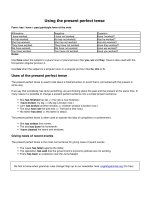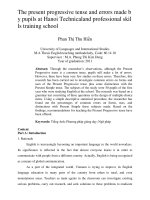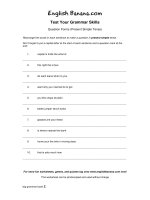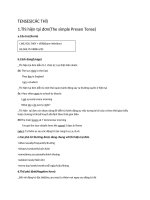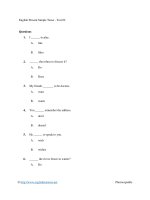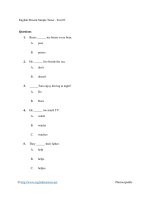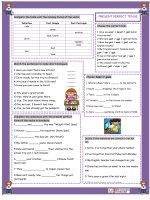The present simple tense
Bạn đang xem bản rút gọn của tài liệu. Xem và tải ngay bản đầy đủ của tài liệu tại đây (86.16 KB, 3 trang )
The present simple tense
A.GRAMMAR: The present simple tense:
1. To Be: ( am / is / are )
a) Affirmative:
S + am / is / are + …………..
Ex: We are students.
b) Negative:
S + am / is / are + not + …………
Ex: My mother is not a farmer.
isn’t
c) Interrogative:
Am / Is / Are + S + ……………….?
Ex: Is your brother a worker? → Yes, he is / No, he isn’t.
2. Ordinary verbs:
a) Affirmative: ( Khẳng định )
I / We / You / They / S ( Số nhiều ) V
He / She / It / S ( số ít )
V( s / es )
Ex:
I go to school every day.
She goes to school every day.
b) Negative: ( phủ định )
I / We / you / they / S ( số nhiều ) do not ( don’t)
V(bare
He / She / It / S ( số ít )
does not( doesn’t ) infinitive)
Ex: I don’t go to school on Sundays.
She doesn’t go to school on Sundays.
c) Interrogative (nghi vấn)
Do
We / you / they / ….
V
(bare
infinitive ) ?
Does
He / she / …….
Ex1: Do you play volleyball?
→ Yes, I do / No, I don’t
Ex2 : Does Lan listen to music after school?
-Yes, she does / No, she doesn’t
+ Use: Diễn tả một sự thật ở hiên tại, một quy luật, một chân lý hiển nhiên
Diễn tả một thói quen,môt sự việc lập đi lập lại ở hiện tại, một phong tục.
Note: Trong thời hiện tại thường, các ngôi (thứ nhất số ít/nhiều, thứ 3 số nhiều) được chia
như ví dụ tổng quát 1/ trên đây, riêng ngôi thứ 3 (ba) số ít (He, she, it - Tom, John,
Hoa ...), ta cần lưu ý các quy tắc sau:
1. Phải thêm "s" vào sau động từ ở câu khẳng định. ( V+s)
Ví dụ: He likes reading books.
She likes pop music.
- Câu phủ định (Xem ví dụ tổng quát 2/ trên đây )
- Câu nghi vấn? (Xem ví dụ tổng quát 2/ trên đây)
2. Ngoài việc "s" vào sau động từ, ta phải đặc biệt chú ý những trường hợp sau:
2.1. Những động từ (Verbs) tận cùng bằng những chữ sau đây thì phải thêm
"ES".
S, X, Z, CH, SH, O
(do, go) + ES
Ví dụ: misses
miss
mix mixes
buzz buzzes
watch watches
wash washes
do does
go goes
Ví dụ: He often kisses his wife before going to work.
Tom brushes his teeth everyday.
2.2. Những động từ (Verbs) tận cùng bằng "Y" thì phải xét hai (2) trường hợp
sau đây.
Nếu trước Y là nguyên âm (vowel) thì sẽ chia như quy tắc 2.1 trên đây.
Y ---- Y + S
We play She/he plays
Ví dụ: She plays the piano very well.
Nếu trước Y là phụ âm (consonant) thì sẽ chia như sau:
(Y ---- IES)
We carry She/he carries
They She/he worries
worry
Ví dụ: He often carries money with him whenever he goes out.
Các trạng từ dùng trong thời HTT:
Always, usually, often, not often, sometimes, occasionally, never;
Everyday, every week/month/year..., on Mondays, Tuesdays, .... , Sundays.
Once/twice / three times... a week/month/year ...;
Every two weeks, every three months (a quarter)
Whenever, every time, every now and then, every now and again, every so
often
Cách phát âm: Với các ngôi thứ ba (3) số ít, đuôi "S" được đọc như sau:
Cách đọc
Các động từ có kết thúc với
đuôi
/s/
F, K, P, T
/iz/
S, X, Z, CH, SH, CE, GE +
ES
/z/
Không thuộc hai loại trên
B-Exercises
Bài tập 1 thì hiện tại đơn cơ bản: Dùng
"do not" hoặc "does not" để hoàn thành
những câu sau
1.I ....... prefer coffee.
2. She ....... ride a bike to her office.
3.Their friends ....... live in a small house.
4. They ....... do the homework on weekends.
5. Mike ....... play soccer in the afternoons.
6. The bus ....... arrive at 8.30 a.m.
7. We ....... go to bed at midnight.
8. My brother ....... finish work at 8 p.m.
Bài tập 2 thì hiện tại đơn: Hoàn thành
cách câu sau
1. ....... Jack like eating hamburgers? => Yes,
........
2. ....... you get up early on Sundays? =>
No, ........
3. ....... the students always work hard for the
exam? => No, ........
4. ....... the train leave at noon every day? =>
Yes, ........
5. ....... he often play the guitar? => No, ........
6. ....... they take a taxi to school every
morning? => Yes, ........
7. ....... Anna and Daisy visit their old
teachers on winter holidays? => No, ........
8. ....... water boil at 100 degrees Celsius? =>
Yes, ........
Bài tập thì hiện tại đơn 3: Hoàn thành các
câu sau
1.Robin (play)..........football every Sunday.
2. We (have)..........a holiday in December
every year.
3.He often (go)..........to work late.
4. The moon (circle)..........around the earth.
5.The flight (start)..........at 6 a.m every
Thursday.
6. Peter (not/ study)..........very hard. He
never gets high scores.
7.My mother often (teach)..........me English
on Saturday evenings.
8.I like Math and she (like)..........Literature.
9.My sister (wash)..........dishes every day.
10. They (not/ have)..........breakfast every
morning.
Bài tập thì hiện tại đơn 4: Hoàn thành
cách câu sau với từ trong ngoặc
1. My brothers (sleep) on the floor. (often)
=>
2. He (stay) up late? (sometimes)
=>
3. I (do) the housework with my brother.
(always)
=>
4. Peter and Mary (come) to class on time.
(never)
=>
5. Why Johnson (get) good marks? (always)
=>
6. You (go) shopping? (usually)
=>
7. She (cry). (seldom)
=>
8. My father (have) popcorn. (never)
=>
Bài tập 5 về thì hiện tại đơn:
Mary is a teacher. She teaches English. The
children love her and they (1).........a lot from
her. Mary (2).........home at 3.00 and
(3).........lunch. Then she sleeps for an hour.
In the afternoon she (4).........swimming or
she cleans her house. Sometimes she
(5).........her aunt and (6).........tea with her.
Every Sunday she does the shopping with
her friends.
Bài tập thì hiện tại đơn 6:
My cousin, Peter (have)...........a dog. It
(be)...........an intelligent pet with a short tail
and big black eyes. Its name (be)...........Kiki
and it (like)...........eating pork. However, it
(never/ bite)...........anyone; sometimes it
(bark)...........when strange guests visit. To be
honest, it (be)...........very friendly. It (not/
like)...........eating fruits, but it (often/
play)...........with them. When the weather
(become)...........bad, it (just/ sleep)...........in
his cage all day. Peter (play)...........with Kiki
every day after school. There
(be)...........many people on the road, so Peter
(not/ let)...........the dog run into the road. He
(often/ take)...........Kiki to a large field to
enjoy the peace there. Kiki (sometimes/
be)...........naughty, but Peter loves it very
much.
